Best Real Estate Marketing Ideas and Plans to get leads
In the competitive world of real estate, generating quality leads is the key to success. As a real estate professional, you know that traditional marketing methods are no longer enough to attract potential buyers and sellers. To thrive in this digital era, you need to embrace innovative and effective marketing strategies. In this blog, we will explore the best real estate marketing ideas and plans that can help you not only generate leads but also build lasting relationships with your clients. Let’s dive in!
Understanding the Importance of Real Estate Marketing
In the fast-paced world of real estate, grasping the significance of effective marketing is the key to unlocking success. Your marketing strategy is the compass that guides you to your target audience, showcasing your unique value proposition and building trust.
Why Effective Marketing is Crucial in the Real Estate Industry
Effective marketing is crucial in the real estate industry as it helps create brand visibility, establishes credibility, and fosters strong connections with potential buyers. A well-executed marketing strategy enables realtors to showcase properties, engage with the right audience, and ultimately drive more leads, resulting in successful property transactions.
Key Benefits of a Well-Planned Real Estate Marketing Strategy
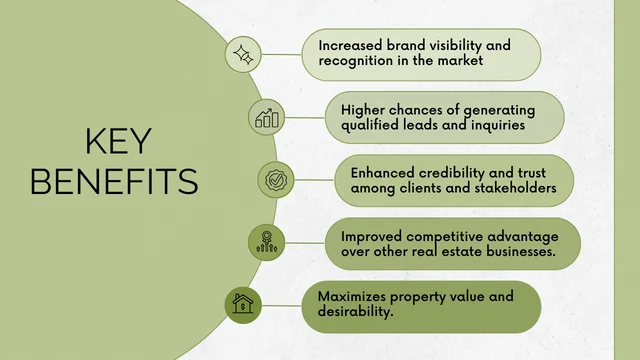
Best Real Estate Marketing Ideas and Plans to get leads
1. Employ the Potential of Virtual Tours and High-Quality Imagery
With the advancement of technology, virtual tours and high-quality imagery have become powerful marketing tools in the real estate industry. Potential buyers appreciate the ability to explore a property from the comfort of their homes, saving time and effort.
- Virtual Tours: Incorporate 360-degree virtual tours of your listed properties. These immersive experiences allow potential buyers to navigate through the property, room by room, almost as if they were physically present. It enhances their understanding and emotional connection to the property.
- High-Quality Imagery: Invest in professional photography to capture the best features of your properties. Eye-catching images can pique the interest of potential buyers and prompt them to schedule a visit or make inquiries.
Fascinating Insights: According to a study by the National Association of Realtors, 54% of buyers are more likely to reach out to agents who offer virtual tours. By incorporating this exciting feature, you not only attract more leads but also create a lasting impression on potential clients.
2. Optimize Your Website for Search Engines
Search Engine Optimization (SEO) is the key to ensuring that your website ranks higher in search engine results. Conduct keyword research to identify popular real estate-related search terms and optimize your website content accordingly. A well-optimized website can significantly increase your organic traffic and lead generation.
Use local SEO tactics for you real estate marketing to target potential clients in specific geographic areas. Optimize your Google My Business listing, include local keywords, and encourage clients to leave reviews on your Google business page.
- Keyword Research: Identify relevant keywords and phrases related to real estate in your area. Incorporate these keywords naturally into your website content.
- Local SEO: Optimize your website for local search by including location-specific keywords and creating Google My Business listings.
- Blogging for SEO: Consistently publish informative blog posts on your website. Blogging not only adds value for readers but also improves your website’s search engine rankings.
To accomplish this, you should hire a marketing agency that offers effective seo services in order to leverage the power of the internet and propel your real estate business forward.
3. Utilize Social Media
Social media has become an indispensable tool for real estate agents and agencies to connect with their target audience. Platforms like Facebook, Instagram, Twitter, and LinkedIn offer excellent opportunities to showcase your property listings and expertise.
Here are some engaging ideas to make the most of social media:
- Visual Storytelling: Use high-quality images and videos to tell compelling stories about the properties you represent. People are drawn to visual content, and creative storytelling can capture their imagination and interest.
- Live Virtual Tours: Take advantage of live video features on platforms like Facebook and Instagram to conduct virtual property tours. This interactive approach allows potential buyers to explore the property in real-time and asks questions on the spot.
- Q&A Sessions: Host regular Q&A sessions where you address common real estate concerns and questions. This positions you as a knowledgeable and helpful resource in the eyes of potential clients.
4. Embrace Video Marketing
Videos have proven to be one of the most engaging types of content across all industries, and real estate is no exception. According to Wyzowl, 90% of consumers find videos helpful in their decision-making process. By creating compelling videos, you can engage your audience and leave a lasting impression that prompts them to reach out to you for their real estate needs.
Use video marketing to:
- Showcase Properties: Create visually appealing property walkthroughs and highlight the unique features of each property. Consider using drone footage to capture breathtaking aerial views.
- Client Testimonials: Encourage satisfied clients to share their success stories through video testimonials. Genuine feedback from happy clients can be a powerful tool in attracting new leads.
- Educational Content: Produce informative videos on various real estate topics, such as home buying tips, market trends, and investment strategies. Valuable educational content positions you as an expert in your field.
5. Blogging for Authority
Starting a real estate blog is an effective way to establish yourself as an authority in the industry. Share your expertise, insights, and tips on various aspects of real estate. Not only will this provide value to your readers, but it will also attract organic traffic to your website.
Some engaging blog post ideas include:
- The Hottest Neighborhoods: Write about the most sought-after neighborhoods in your area, highlighting their unique characteristics and amenities.
- Tips for First-Time Homebuyers: Offer valuable advice to first-time buyers, guiding them through the process and potential pitfalls.
- Investing in Real Estate: Discuss the advantages and challenges of real estate investing, catering to both novice and experienced investors.
- Home Staging Tips: Provide practical tips on how to stage a property for maximum appeal to potential buyers.
Real Estate Marketing Tip: Incorporate long-tail keywords in your blog posts to improve your chances of ranking higher in search engine results. For example, “Tips for First-Time Homebuyers in [Your City]” or “How to Stage Your Home for a Quick Sale.”
6. Offer Referral Incentives
Word-of-mouth marketing is a potent force in the real estate industry. Encourage satisfied clients to refer their friends and family to you by offering referral incentives. For this create a referral program that offers incentives to clients who refer new business to you. This could be in the form of a discount on commission, gift cards, or home-related gifts.
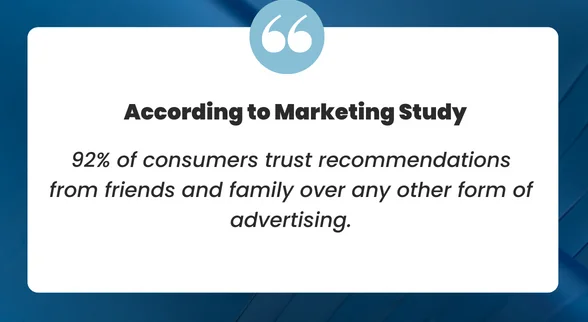
- Discounts on Commission: Consider offering a percentage off your commission for successful referrals. This not only incentivizes clients but also demonstrates your gratitude for their support.
- Exclusive Services: Provide exclusive services or bonuses to clients who refer business to you. This could include priority access to new listings or personalized property recommendations.
- Client Appreciation Events: Organize client appreciation events to show gratitude to those who have referred clients to you. This fosters a sense of community and strengthens relationships.
7. Collaborate with Local Influencers
Partnering with local influencers can significantly boost your real estate marketing efforts. Influencers have established credibility and a loyal following in their respective niches. A study by Forbes revealed that 92% of consumers trust recommendations from individuals over traditional advertising. Leveraging local influencers can help you tap into their existing audience, gaining the trust of potential clients.
Consider the following collaboration opportunities:
- Real Estate Bloggers: Collaborate with popular real estate bloggers who have a substantial following. They can promote your listings and services to their audience.
- Home Decor Influencers: Partner with home decor influencers who can showcase the aesthetic potential of the properties you represent.
- Community Leaders: Forge relationships with community leaders and get involved in local events to build trust and credibility within the community.
8. Run Facebook Ads
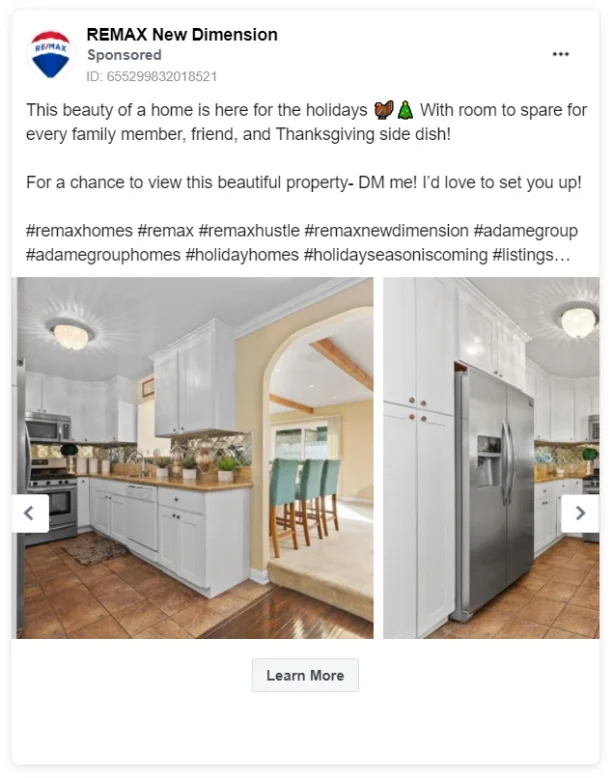
Create compelling ad copy and use high-quality visuals to capture your audience’s attention. Consider running lead generation ads that direct users to a landing page where they can provide their contact information in exchange for valuable content, such as a free home valuation or market report.
9. Leverage Emails for Real Estate Marketing
Email marketing continues to be an effective way to nurture leads and maintain communication with potential clients for real estate marketing. According to a study by the Content Marketing Institute, email marketing has an average return on investment (ROI) of 3800%, making it a highly cost-effective strategy for lead generation.
Here are some tips for successful email marketing campaigns:
- Segmented Lists: Segment your email list based on various criteria, such as buyer’s interests, location, or stage in the buying process. This allows you to send personalized and relevant content to different groups.
- Drip Campaigns: Set up automated email sequences, known as drip campaigns, to deliver a series of timely and valuable content to leads over time. This keeps your brand top-of-mind and encourages engagement.
- Newsletter Subscriptions: Offer valuable content, such as market insights, new listings, and community updates, to encourage visitors to subscribe to your newsletter.
10. Collaborate with Local Businesses
Building partnerships with local businesses can expand your reach and attract new leads. Connect with moving companies, interior designers, mortgage brokers, and home improvement businesses. By referring clients to each other, you create a network of trusted professionals, benefiting everyone involved.
11. Implement Augmented Reality (AR) and Virtual Reality (VR) Technologies
As technology advances, incorporating AR and VR in your real estate marketing efforts can set you apart from the competition. AR can allow potential buyers to visualize how they can decorate and furnish a property, adding a personal touch. VR, on the other hand, can provide an immersive experience of a property, as if the viewer were physically present like this.
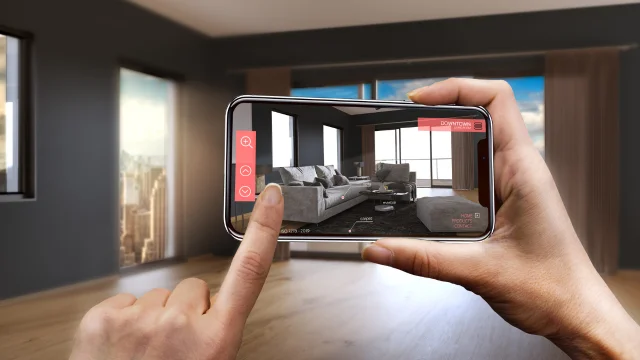
According to a report by Goldman Sachs, the VR and AR market is expected to reach $80 billion by 2025. By embracing these technologies, you demonstrate your commitment to innovation and cutting-edge modern marketing strategies.
- Virtual Staging: Use AR to virtually stage properties, allowing potential buyers to visualize different furniture layouts and interior designs.
- VR Property Tours: Offer VR property tours that go beyond regular virtual tours. These immersive experiences can provide a 360-degree view of a property and its surroundings.
- Architectural Visualization: For pre-construction properties, use AR and VR to showcase what the completed project will look like, enhancing buyers’ understanding and excitement.
12. Create Interactive Content
Interactive content is a powerful way to engage potential clients and keep them interested. It encourages active participation and creates a memorable experience. Some interactive content ideas include:
- Quizzes and Surveys: Create fun quizzes that help potential buyers identify their ideal property features, such as their preferred neighborhood, property type, or design style.
- Mortgage Calculators: Offer online mortgage calculators on your website, allowing visitors to estimate their monthly mortgage payments based on different scenarios.
- Neighborhood Guides: Develop interactive maps that highlight important amenities, schools, and recreational facilities in different neighborhoods.
Bonus Tip
13. Use drone photography
You can use drone photography to capture sweeping photographs of the exterior and surrounding landscapes of your home. To create the perfect shot, purchase a drone or use a drone service, such as HouseLens or Sold by Air. Use the photographs to enhance the appeal of your listings. With video, you can supplement virtual tours and walkthroughs with exterior features such as patios and pools.
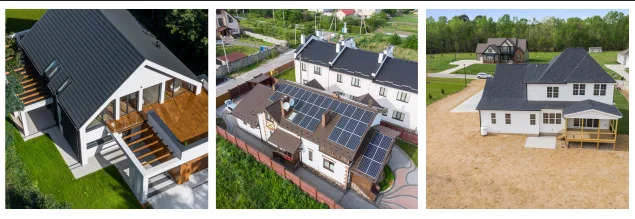
Do not have the drone photography chops to show your clients’ homes in their best light? Services such as Drone Base have thousands of qualified photographers around the world. They specialize in both residential and commercial real estate.
Conclusion
In the ever-evolving world of real estate marketing, staying ahead of the curve is essential to attracting leads and growing your business. By embracing content marketing, social media, video marketing, email campaigns, influencer collaborations, webinars, SEO, and emerging technologies like AR and VR, you can create a holistic and effective marketing plan.
Remember, providing value to your audience through informative and engaging content is the key to building trust and attracting potential clients. With these best real estate marketing ideas and plans at your disposal, you are well-equipped to seize the opportunities and thrive in the competitive real estate landscape.

